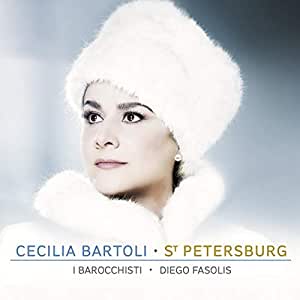St. Petersburg / Cecilia Bartoli, Diego Fasolis
It was around 1785 that Daikokuya Kotayu of Yasushi Inoue’s historical novel “Rusian Dream” had an audience with the Russian Empress Catherine, so it was a little earlier than that. In St. Petersburg, Russia, a musical culture that rivaled that of Western Europe was flourishing at that time. Today’s CD is a program that provides an overview of the musical achievements of the city. St. Petersburg is also the birthplace of Vladimir Putin, the “man-of-the-hour”. Five musicians were active there. However, except for Manfredini and Cimarosa, you may not be familiar with these composers. That’s because this is a collection of works by German and Italian musicians who served three empresses (Anna, Elizabeth and Catherine) in St. Petersburg, Russia, in the 18th century for a long time. Vincenzo Manfredini is the son of Francesco Manfredini, famous for his Christmas concerto. Francesco Domenico Alaja (Alaia), born in Naples in 1709, was invited to St. Petersburg in 1735 with the Italian Opera Company and serve the Empress Elisaveta, and produced many operas. Herman Fridrich Raupach was born in Germany in 1728, went to Russia in 1755, and died in St. Petersburg in 1778; he returned home for a time in 1762 and came into contact with Mozart in Paris. Mozart arranged his piano sonatas into concertos. Domenico dall’Oglio was born in 1720, studied violin with Tartini, and went to St. Petersburg in 1735, where he lived for 29 years. Although he mainly composed instrumental music, he also wrote a vocal piece called “Prologue” to Johann Adolph Hasse’s opera “La Clemenza di Tito” (The Mercy of Emperor Tito).
After listening to this CD, I can say that all of the pieces are unmistakably first-rate musical works. And most importantly, all of these scores were “discovered” by Cecilia Bartoli herself in the library of the Mariinsky Theatre in St. Petersburg. The singers themselves found and sang the music, rather than having it discovered by a scholar and then transcribed by a singer (thus, all of the music is first-ever recorded), a process similar to that of the Zelenka trio sonatas introduced by Heinz Holliger. The supporting ensemble of old music, conducted by Diego Fasolis, is also at its best.You shou#baroque #bartoli #片山俊幸ld have a listen.


